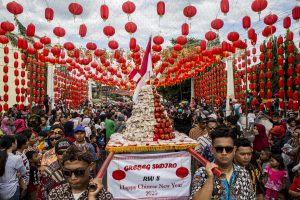People around the world are preparing to welcome the Chinese New Year, which falls on January 25, 2020. That including residents in the city of Surakarta (or Solo), Central Java, Indonesia. They celebrated the Chinese New Year by holding a festival called Grebeg Sudiro a week before the turn of the year.
This festival combines Javanese and Chinese culture. Its existence is not only a symbol of tolerance but also a cross-ethnic celebration that invites all people to treasure diversity.
At the event, various crops — such as vegetables, fruits, and traditional snacks – are piled in the form of mountains. Not only that, but there are also more than 4,000 traditional Chinese cakes. The delicacies were all featured in a parade of over three kilometers, beginning from the Tien Kok Sie Temple, then distributed for free to thousands of visitors.
Also on display were a variety of Javanese and Chinese arts: dragon and lion dances, Reog Ponogogo (a traditional Javanese dance), and Javanese traditional puppets. The performances took place under thousands of red lanterns mounted on the gate of the Chinatown area.
This festival is a reminder of the history of the Chinese community in the city of Solo. The first Chinese immigrants arrived as migrant traders. Bengawan Solo River, which divides Java Island, became an artery of interaction between ethnic groups through trade activities. From there emerged Pasar Gede (“Big Market” in the Javanese language), which became the center of buying and selling for local residents.
Over time the Chinese traders settled in an area located behind Pasar Gede. The area is now named Sudiroprajan. They lived side-by-side with the local people and a process of assimilation began between these ethnic groups through mixed marriages. To showcase the blending that has been going on for decades, the residents created the tradition of Grebeg Sudiro.
Grebeg Sudiro began to be held on the massive scale we see today in 2007, even though it was developed from pre-existing traditions.
During the 32-year New Order regime under the leadership of President Suharto, ethnic Chinese faced various kinds of discriminatory behavior. They were prohibited from practicing Chinese religious ceremonies, beliefs, and customs in public places, including the New Year celebrations. Chinese descendants in Indonesia were thus unable to preserve their ancestral culture freely.
The restrictions ended when President Abdurrahman Wahid, familiarly known as Gus Dur, issued a new regulation that finally restored the ability of the Chinese community to carry out their religious activities, and fought for their civil rights, including the holding of various traditional rituals and ceremonies.
As a result, today the Chinese New Year is designated as a national holiday. Now Indonesians of Chinese descent can celebrate the New Year freely — the lion dance can be performed in any place and lanterns can be installed in any corners of the city and shopping areas.















































